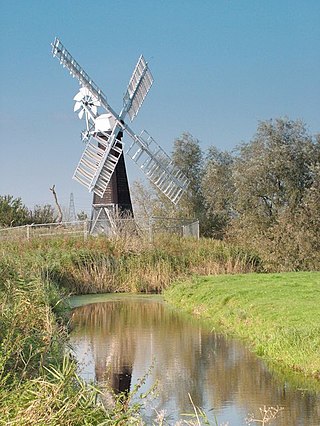Thompson v Park [1944] KB 408 is an English law case, concerning licenses in land.
Thompson v Park [1944] KB 408 is an English law case, concerning licenses in land.
Mr. Thompson, the school's headmaster, wanted an injunction for Mr. Park to leave his school, after Mr. Park had forced his way back into the premises which they had amalgamated as a joint venture together at Broughton Hall, Eccleshall, Staffordshire. Park had a class of 25 pupils before relations broke down, and Thompson had revoked the license. Park countered that he had been denied of his investment.
Goddard LJ granted the injunction because of the behavior Park demonstrated. [1]
... the court cannot specifically enforce an agreement for two people to live peaceably under the same roof - yet, of course, if the contract is broken, [B] has got a common law remedy in damages, which, if he is right, might be heavy. [B], however did not seek the intervention of the court, but took the law into his own hands and remedied the grievances under which he felt he was suffering in a manner which seems to me to have been wholly deplorable, all the more so when one considers that he is in charge of small boys at a preparatory school and ought to be inculcating into them a respect for authority and discipline. It appears to me that on his own showing he has been guilty at least of riot, affray, wilful damage, forcible entry and, perhaps, conspiracy… The licensee, once his licence is withdrawn, has no right to re-enter on the land. If he does, he is a common trespasser.

An injunction is an equitable remedy in the form of a special court order that compels a party to do or refrain from specific acts. "When a court employs the extraordinary remedy of injunction, it directs the conduct of a party, and does so with the backing of its full coercive powers." A party that fails to comply with an injunction faces criminal or civil penalties, including possible monetary sanctions and even imprisonment. They can also be charged with contempt of court.
Nuisance is a common law tort. It means something which causes offence, annoyance, trouble or injury. A nuisance can be either public or private. A public nuisance was defined by English scholar Sir James Fitzjames Stephen as,
"an act not warranted by law, or an omission to discharge a legal duty, which act or omission obstructs or causes inconvenience or damage to the public in the exercise of rights common to all Her Majesty's subjects".

English contract law is the body of law that regulates legally binding agreements in England and Wales. With its roots in the lex mercatoria and the activism of the judiciary during the Industrial Revolution, it shares a heritage with countries across the Commonwealth, from membership in the European Union, continuing membership in Unidroit, and to a lesser extent the United States. Any agreement that is enforceable in court is a contract. A contract is a voluntary obligation, contrasting to the duty to not violate others rights in tort or unjust enrichment. English law places a high value on ensuring people have truly consented to the deals that bind them in court, so long as they comply with statutory and human rights.

United Kingdom administrative law is part of UK constitutional law that is designed through judicial review to hold executive power and public bodies accountable under the law. A person can apply to the High Court to challenge a public body's decision if they have a "sufficient interest", within three months of the grounds of the cause of action becoming known. By contrast, claims against public bodies in tort or contract are usually limited by the Limitation Act 1980 to a period of 6 years.

Waltons Stores (Interstate) Ltd v Maher, is a leading case in Australian contract law. The Australian High Court decided that estoppel, in certain circumstances, could be a cause of action.

Leaf v International Galleries [1950] 2 KB 86 is an English contract law case concerning misrepresentation, mistake and breach of contract, and the limits to the equitable remedy of rescission.

Attorney General v Blake[2000] UKHL 45, [2001] 1 AC 268 is a leading English contract law case on damages for breach of contract. It established that in some circumstances, where ordinary remedies are inadequate, restitutionary damages may be awarded.

Liverpool City Council v Irwin [1976] UKHL 1 is a leading English contract law case concerning the basis on which courts may imply terms into contracts; in particular in relation to all types of tenancies, a term may be implied if required for a particular relationship, such as for the landlord to keep the stairwells clear in a tower block. The tenants also had a duty of reasonable care which some among them had been repeatedly breached and led to a continuing breach in matters of damage about which they complained so they were not entitled to withhold rent on the facts.

Crabb v Arun District Council [1975] EWCA Civ 7 is a leading English land law and contract case concerning "proprietary estoppel". Lord Denning MR affirmed that where agreements concern the acquisition of rights over land, there is no need for both parties to provide a consideration for upholding the bargain. While promissory estoppel cannot found a cause of action it was held that in the peculiar situation of land, consideration is not necessary at all.
Privacy in English law is a rapidly developing area of English law that considers situations where individuals have a legal right to informational privacy - the protection of personal or private information from misuse or unauthorized disclosure. Privacy law is distinct from those laws such as trespass or assault that are designed to protect physical privacy. Such laws are generally considered as part of criminal law or the law of tort. Historically, English common law has recognized no general right or tort of privacy, and offered only limited protection through the doctrine of breach of confidence and a "piecemeal" collection of related legislation on topics like harassment and data protection. The introduction of the Human Rights Act 1998 incorporated into English law the European Convention on Human Rights. Article 8.1 of the ECHR provided an explicit right to respect for a private life. The Convention also requires the judiciary to "have regard" to the Convention in developing the common law.

Errington v Wood[1951] EWCA Civ 2 is an English contract law and English land law judicial decision of the Court of Appeal concerning agreement and the right to specific performance of an assurance that is relied on.

English land law is the law of real property in England and Wales. Because of its heavy historical and social significance, land is usually seen as the most important part of English property law. Ownership of land has its roots in the feudal system established by William the Conqueror after 1066, but is now mostly registered and sold on the real estate market. The modern law's sources derive from the old courts of common law and equity, and legislation such as the Law of Property Act 1925, the Settled Land Act 1925, the Land Charges Act 1972, the Trusts of Land and Appointment of Trustees Act 1996 and the Land Registration Act 2002. At its core, English land law involves the acquisition, content and priority of rights and obligations among people with interests in land. Having a property right in land, as opposed to a contractual or some other personal right, matters because it creates priority over other people's claims, particularly if the land is sold on, the possessor goes insolvent, or when claiming various remedies, like specific performance, in court.

Sinclair Investments (UK) Ltd v Versailles Trade Finance Ltd[2011] EWCA Civ 347 is an English trusts law case, concerning constructive trusts. Sinclair was partially overruled in July 2014 by the UK Supreme Court in FHR European Ventures LLP v Cedar Capital Partners LLC.

Verrall v Great Yarmouth BC [1981] QB 202 is a land and contract law case on the arbitrary revocation of an agreed, future licence in land for good consideration.

Manchester Airport plc v Dutton[1999] EWCA 844 is an English land law case, concerning licences in land. It confirmed the court will attach to licences, even where narrowly drawn to avoid giving away title, a right to occupy provided it meets with the clear commercial purposes of the contract. This means those third parties, in this case protestors, who interfered with such rights must be removed.

Das v Linden Mews Ltd[2002] EWCA Civ 590 is an English land law case, concerning rights of way.

Green v Lord Somerleyton is an English land law and tort law case, concerning easements of surface water/ditch drainage and the tests for nuisance in English law. In this case there was no remedy for the flooding found to be natural and not recently exacerbated by the defendant. The court attached to the properties an old, 1921, easement of drainage passing both land holdings, in this case two common examples of lowland water engineering, dykes controlled against tides by one-way valves, mentioned in the properties' deeds and, duplicatively, established the right by prescription. The dykes lay in the claimant's own land who had failed to maintain them and failed to account for the flows caused by reduction of water extraction from the lake upstream. The claimant had failed to repair the pump and clear ditches on his own land which had been agreed between the previous owners to give channelled drainage from a lake above. It was for the claimant to recognise the danger posed by its waterline being raised in 1954 by the building up of a weir.

Crow v Wood[1970] EWCA Civ 5 is an English land law case, confirming an easement commonly exists for the right to have a fence or wall kept in repair expressed in earlier deeds, which is a right which is capable of being "granted" by law and secondly, as a separate but on the facts, related issue, of the right of common land pasture asserted by continued use.

Banque Belge pour L’Etranger v Hambrouck [1921] 1 KB 321 is an English trusts law case concerning the common law remedies for receipt of trust property.

FHR European Ventures LLP v Cedar Capital Partners LLC[2014] UKSC 45 is a landmark decision of the United Kingdom Supreme Court which holds that a bribe or secret commission accepted by an agent is held on trust for his principal. In so ruling, the Court partially overruled Sinclair Investments (UK) Ltd v Versailles Trade Finance Ltd in favour of The Attorney General for Hong Kong v Reid (UKPC), a ruling from the Judicial Committee of the Privy Council on appeal from New Zealand.